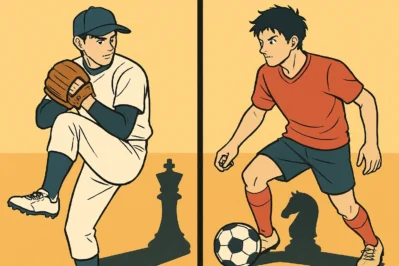The Mind Game: Winning in Korean with Sports Strategy
Hello! Welcome to Daily Hangul (매일한글), where we upgrade your Korean skills to the next level!
Today, we’re diving into a topic that’s as thrilling as a last-minute goal: Game Theory in Sports. We’ll explore the strategic language used to analyze high-stakes moments like a soccer penalty kick or a tense pitcher-batter duel in baseball. Lately in Korea, sports analysis has gone mainstream. It’s no longer just for commentators; fans on YouTube and community sites passionately debate the deep strategies behind every play. Understanding this language will not only help you enjoy K-Sports on a whole new level but also allow you to engage in sophisticated, strategic conversations in any field. Let’s get into the mind games!
Core Expressions: Think Like a Strategist
Here are some key terms that will make you sound like a pro sports analyst in Korean.
1. 한국어 표현: 수싸움 (su-ssa-um)
* 발음 [로마자]: su-ssa-um
* 영어 뜻: A battle of wits; a strategic fight.
* 상세 설명: This is a fantastic, high-level word. 수 (su) can mean ‘number’ or ‘move/method’ (like in chess), and 싸움 (ssa-um) means ‘fight’. Together, 수싸움 refers to the invisible battle of strategies and counter-strategies between opponents. It’s not a physical fight, but a mental one, where each side tries to anticipate and outmaneuver the other. It’s commonly used in sports, business negotiations, and even political commentary.
2. 한국어 표현: 심리전 (sim-ni-jeon)
* 발음 [로마자]: sim-ni-jeon
* 영어 뜻: Psychological warfare; a mind game.
* 상세 설명: 심리 (sim-ni) means ‘psychology’ and 전 (jeon) means ‘war’. This term perfectly describes situations where the goal is to unsettle your opponent mentally. Think of a baseball pitcher staring down a batter, or a soccer player trying to guess which way the goalkeeper will dive during a penalty kick. That tense, non-verbal communication is the essence of 심리전.
3. 한국어 표현: 허를 찌르다 (heo-reul jji-reu-da)
* 발음 [로마자]: heo-reul jji-reu-da
* 영어 뜻: To catch someone off guard; to exploit an unguarded point.
* 상세 설명: This is a brilliant idiom. 허 (heo) refers to a weak or unguarded spot, and 찌르다 (jji-reu-da) means ‘to poke’ or ‘to stab’. So, the expression literally means “to poke a weak spot.” It’s used when a player makes an unexpected move that the opponent wasn’t prepared for, completely disrupting their strategy. For example, a batter hitting a bunt when a home run is expected.
4. 한국어 표현: 변수를 창출하다 (byeon-su-reul chang-chul-ha-da)
* 발음 [로마자]: byeon-su-reul chang-chul-ha-da
* 영어 뜻: To create a variable; to introduce an unexpected factor.
* 상세 설명: This is a very sophisticated phrase. 변수 (byeon-su) is a ‘variable’ or an ‘unknown factor’, and 창출하다 (chang-chul-ha-da) is a formal verb for ‘to create’. In a strategic context, you don’t just react to the game; you actively try to 변수를 창출하다—to introduce a new element that your opponent hasn’t accounted for. This could be an unconventional field formation in soccer or a surprise player substitution.
Example Dialogue: A Night at the Ballpark
Let’s see how these expressions play out in a conversation between two friends watching a critical KBO (Korean Baseball Organization) game.
A: 와, 9회 말 투아웃 만루네. 진짜 긴장된다.
(Wa, gu-hoe mal tu-aut man-ru-ne. Jin-jja gin-jang-doen-da.)
Wow, bottom of the 9th, two outs, bases loaded. I’m so nervous.
B: 지금부터 진짜 수싸움이지. 투수가 계속 똑같은 공만 던지면 타자한테 읽히거든.
(Ji-geum-bu-teo jin-jja su-ssa-um-i-ji. Tu-su-ga gye-sok ttok-ga-teun gong-man deon-ji-myeon ta-ja-han-te il-ki-geo-deun.)
The real battle of wits starts now. If the pitcher keeps throwing the same ball, the batter will read him.
A: 맞아. 여기서 엄청난 심리전이 벌어지겠는데. 타자 표정 좀 봐.
(Ma-ja. Yeo-gi-seo eom-cheong-nan sim-ni-jeon-i beo-reo-ji-gen-neun-de. Ta-ja pyo-jeong jom bwa.)
Exactly. A huge mind game is about to unfold. Look at the batter’s expression.
B: 이럴 때 감독이 작전으로 변수를 창출해야 해. 갑자기 투수를 바꾼다거나. 아! 저기 봐! 투수가 완전히 예상 밖의 느린 공으로 허를 찔렀어! 삼진 아웃!
(I-reol ttae gam-dok-i jak-jeon-eu-ro byeon-su-reul chang-chul-hae-ya hae. Gap-ja-gi tu-su-reul ba-kkun-da-geo-na. A! Jeo-gi bwa! Tu-su-ga wan-jeon-hi ye-sang bak-kui neu-rin gong-eu-ro heo-reul jjil-leos-seo! Sam-jin aut!)
This is when the manager needs to create a variable with a new play. Like suddenly changing the pitcher. Ah! Look there! The pitcher totally caught him off guard with an unexpectedly slow ball! Strikeout!
Culture Tip & Trend Deep Dive
The concepts of 수싸움 and 심리전 are deeply embedded in the Korean psyche, far beyond sports. You’ll see this strategic mindset praised in many areas:
- Business: Korean corporate culture often discusses business negotiations as a fierce
수싸움, where reading the opponent’s intentions and employing sharp심리전tactics are key to success. - Historical Dramas (사극): Watch any popular historical drama, and you’ll see court officials and kings engaged in constant
수싸움for power. The dialogue is filled with characters trying to허를 찌르다their political rivals. - Modern Media: As mentioned, popular sports YouTube channels in Korea like “이스타TV” or “달수네라이브” have gained millions of subscribers by breaking down the complex
수싸움of soccer matches. They analyze how a coach’s strategy was designed to변수를 창출하다and win the crucial심리전on the field. Knowing these terms allows you to participate in these modern cultural conversations.
Let’s Wrap It Up & Practice!
Today, we learned four powerful expressions—수싸움 (battle of wits), 심리전 (mind game), 허를 찌르다 (to catch off guard), and 변수를 창출하다 (to create a variable)—that are essential for discussing strategy in Korean. These words will elevate your Korean from just descriptive to deeply analytical.
Practice Time:
Think about a favorite movie, book, or even a real-life negotiation you’ve experienced. Can you describe a key moment using at least two of the expressions we learned today?
For example: “In the movie’s final chess match, the protagonist won the intense 수싸움 by using a surprising move to 허를 찌르다 her opponent.”
Leave your own strategic analysis in the comments below using today’s vocabulary! We’d love to see how you use them. Good luck






